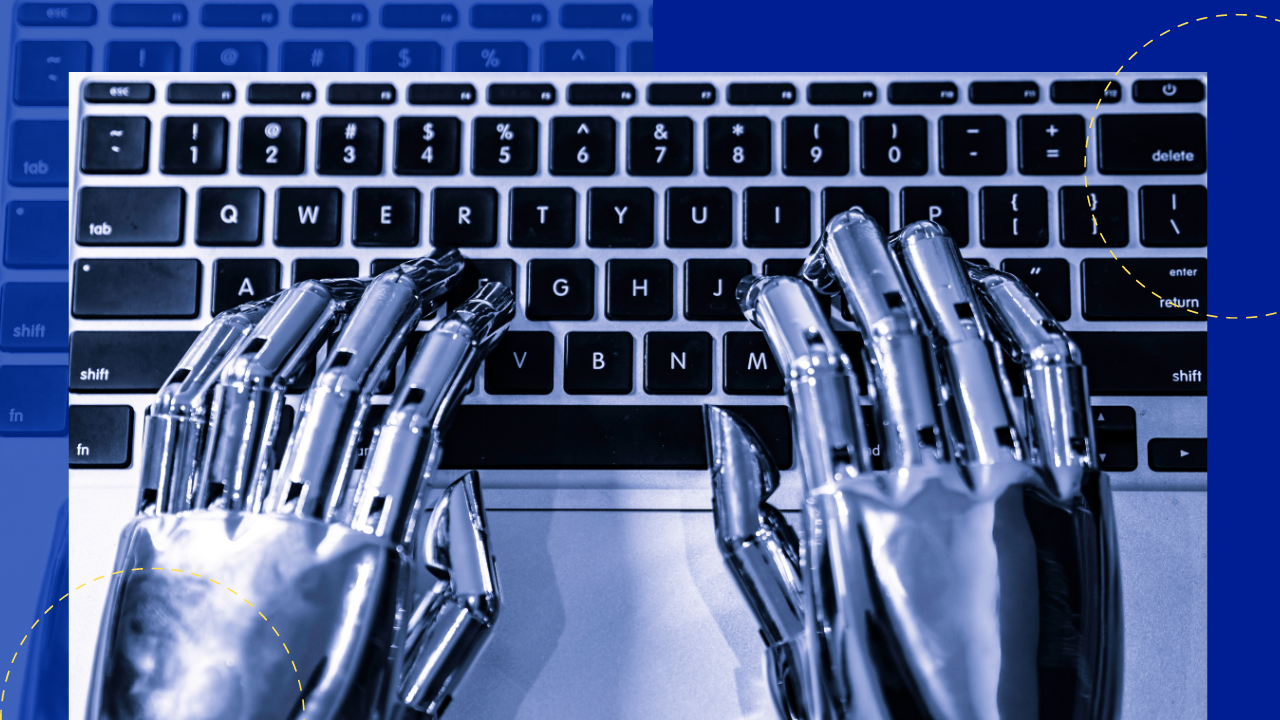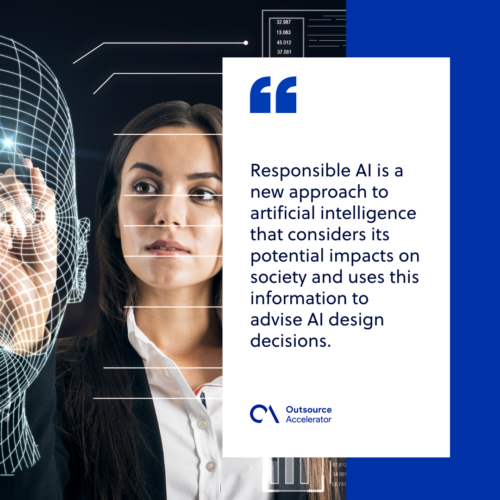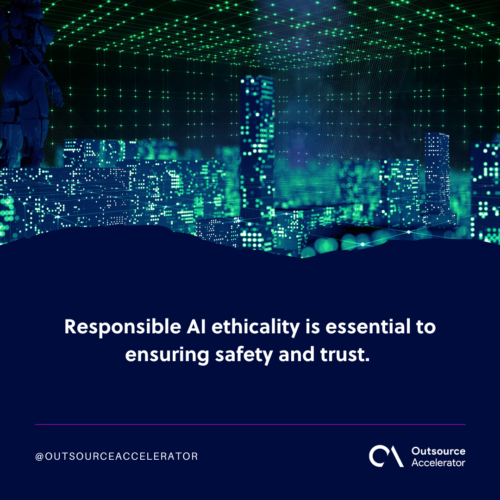Responsible AI: Principles and practices

Many industries, including finance, healthcare, retail, manufacturing, and transportation, have adopted artificial intelligence (AI).
It’s also being used for government projects like autonomous vehicles, facial recognition software, and surveillance systems.
The technology is expanding rapidly, and many hope that with its rise comes the priority of responsible AI as well. It’s not doom and gloom, and a Terminator-style future is farfetched.
Still, AI ethics[1] is an area to pay more attention to, and responsible AI is one step in the right direction.
Let a reliable service provider such as Saigon Technology help you develop AI systems based on your standards.
What responsible AI is and why it matters
Responsible AI is a new approach to artificial intelligence that considers its potential impacts on society and uses this information to advise AI design decisions.
Responsible AI is developed to enhance human potential and well-being while protecting against potential harm. The concept encompasses ethical considerations, technical challenges, and regulatory issues.
While the study of AI ethics is relatively young, concerns about its responsible use were raised as early as 1948 when MIT professor Norbert Wiener brought up their potential misuse.
With AI use rising, the conversation becomes more urgent.
AI can potentially improve our lives, but it comes with new challenges and risks. We are now at a critical point where we must ensure we are developing responsible AI that can benefit people and society.

Responsible AI implementation
Responsible AI implementation means that its ethical considerations are addressed at every stage of development.
Krijger et al. have proposed a framework for maturity models[2] for responsible AI. Businesses use maturity models all the time as tools to measure their current status and how capable they are of continuous improvement.
Their AI ethics maturity model outlines step-by-step levels of maturity. As each level progresses, so does the measure of ethical awareness and accountability within the company developing the responsible AI.
It is as follows:
- Level 1: First, awareness about AI ethics is present among individuals
- Level 2: Orientations and training about AI ethics take place
- Level 3: Context-specific guidelines are developed and implemented in AI processes
- Level 4: Safeguarding mechanisms are set up and integrated
- Level 5: Organization-wide integration, monitoring, and training on AI applications under legislation and policy frameworks
Key principles of responsible AI
Responsible AI design is guided by principles that reflect the social, legal, and ethical frameworks that support it.
These key principles may differ per organization, but what follows are a few of the most common:
Fairness
Responsible AI should promote fairness in decision-making by ensuring no group has an advantage over the others. This means training the AI models on both sensitive and non-sensitive data.
Special attention should also be given, so AI systems don’t discriminate, including based on race or gender.
Ethicality
Responsible AI ethicality is essential to ensuring safety and trust.
Designers of responsible AI should consider ethical issues at every stage of their work- from data collection through deployment.
Responsible AI should not violate human rights or harm any people in any way. For example, if an AI is tasked with making medical decisions, it should never make any decision that could lead to a patient’s death or suffering.

Transparency and explainability
Transparency doesn’t mean just making data available. It should be understood as providing explanations for decisions made by responsible AI algorithms in ways that enable regular people to comprehend them.
Companies should be able to explain how their responsible AI uses data to train their algorithms and how these algorithms make decisions.
People must be able to understand what information is being used to make decisions about and for them.
Accountability
Through accountability, AI is held responsible for its actions and decisions. This means there should be a way to identify and trace the decisions made to their source.
As AI becomes more pervasive in different aspects of our lives, its accountability becomes a bigger talking point. The issue isn’t actually new, and many entities, including government organizations, are studying accountability frameworks to address the topic.
Privacy and security
Privacy allows people to choose how their data is used and what information is made available. This helps responsible AI protect against discrimination, abuse, and harassment.
Security is also essential. It ensures the responsible AI takes steps to protect client information from hackers for criminal gain.
Best practices for responsible AI
To ensure responsible AI is implemented in your organization, consider the following best practices:
Define what responsible AI means for your company
The first step is clearly defining what responsible AI means to your company’s objectives and culture.
To help you define what responsible AI means, consider these three subject areas:
- Data collection. How do you collect and use data? What are the ethical implications of those choices? How do they affect employees?
- Algorithms. What kind of ethical questions do your responsible AI algorithms raise? Are there any biases or blind spots? How can they be fixed?
- Impact. How does your responsible AI impact people’s lives?
Establish human and AI governance
Policies and procedures should govern responsible AI. Creating an information security policy that defines how employees use data analytics tools is critical.
Governance structures should be established at every level to guide responsible AI development and deployment. And, of course, humans must remain involved in the decision-making process.
Integrate available tools
It can be tempting to try reinventing the wheel by developing your own tools, but aside from being expensive, this can raise ethical concerns about your agenda.
There is already a wealth of open-source responsible AI toolkits to use. Wherever possible, have your company use and integrate existing tools to ensure community accountability.
Make the work as measurable as possible
Making your responsible AI work measurable involves using historical data, benchmarks, and other metrics to evaluate success. It also includes establishing performance goals and tracking how well you meet them.
By doing so, you can improve your AI system over time.
The more you can quantify the benefits of your responsible AI, the better able you’ll be to explain them to others and justify its use.
Create a diverse culture of support
Diverse teams have different perspectives on how technology should be used. By hiring people from assorted backgrounds, companies should be able to build responsible AI systems that are fair and useful for most.
Fair and responsible AI should benefit all genders, people of color, and those from different socioeconomic backgrounds.
Additionally, this helps build trust in responsible AI models, prevents bias from creeping in, and leads to better results for everyone.
References:
[2.] Framework for maturity models. Krijger, J., Thuis, T., de Ruiter, M., Ligthart, E. and Broekman, I., 2022. The AI ethics maturity model: a holistic approach to advancing ethical data science in organizations. AI and Ethics, pp.1-13.







 Independent
Independent




